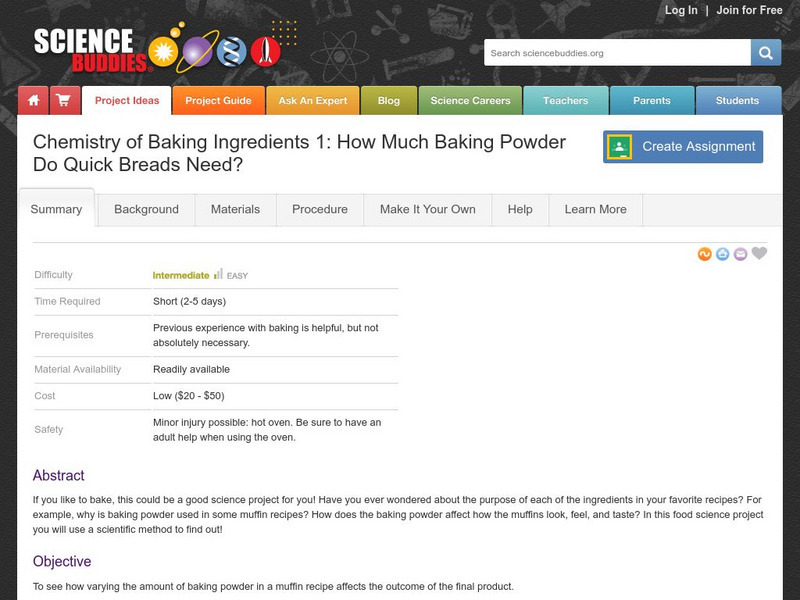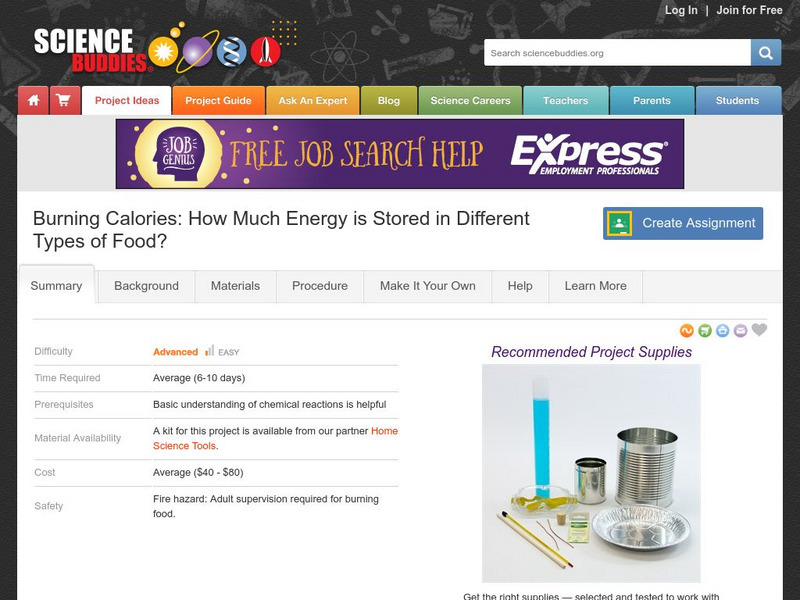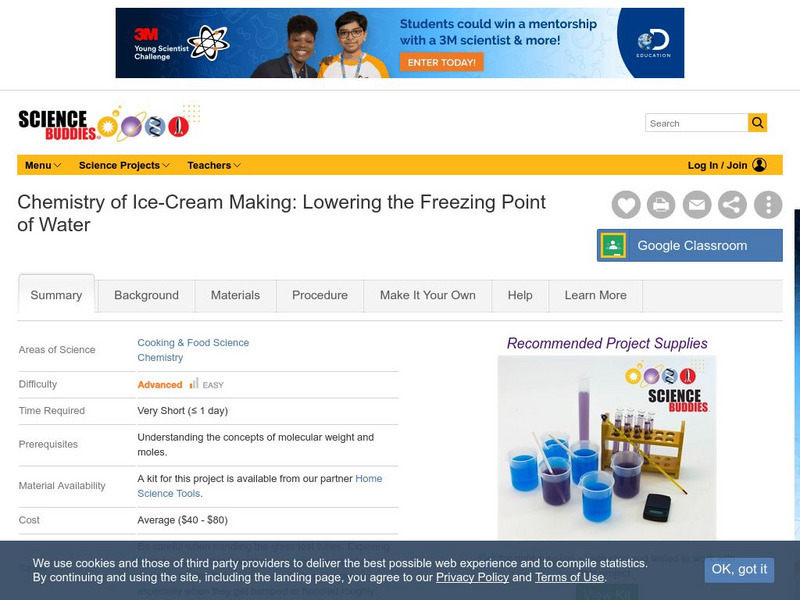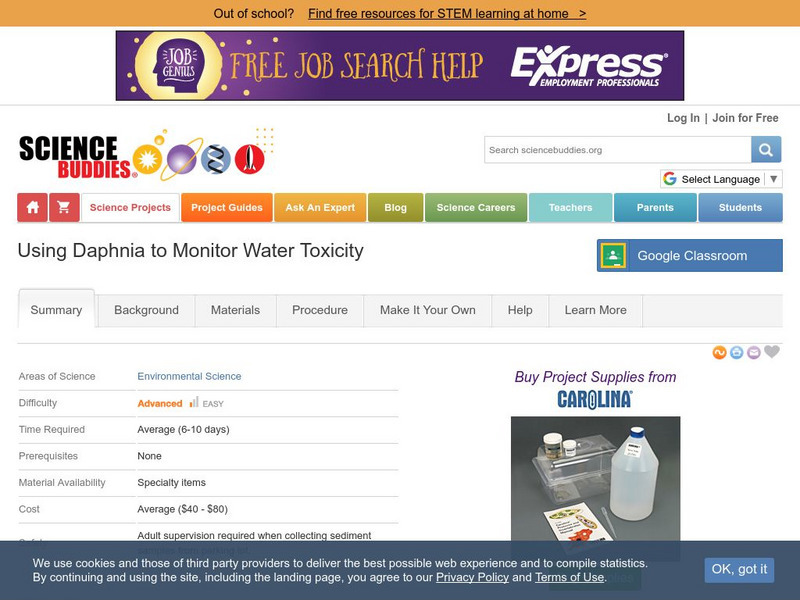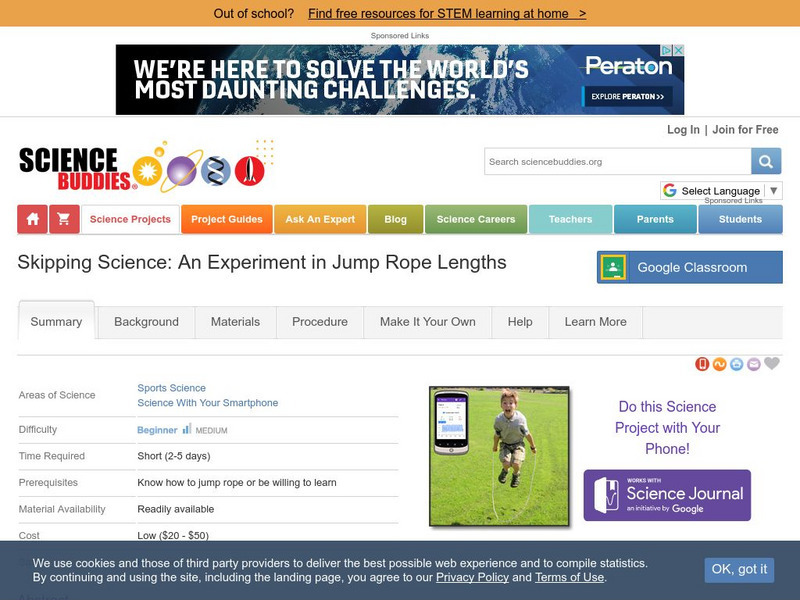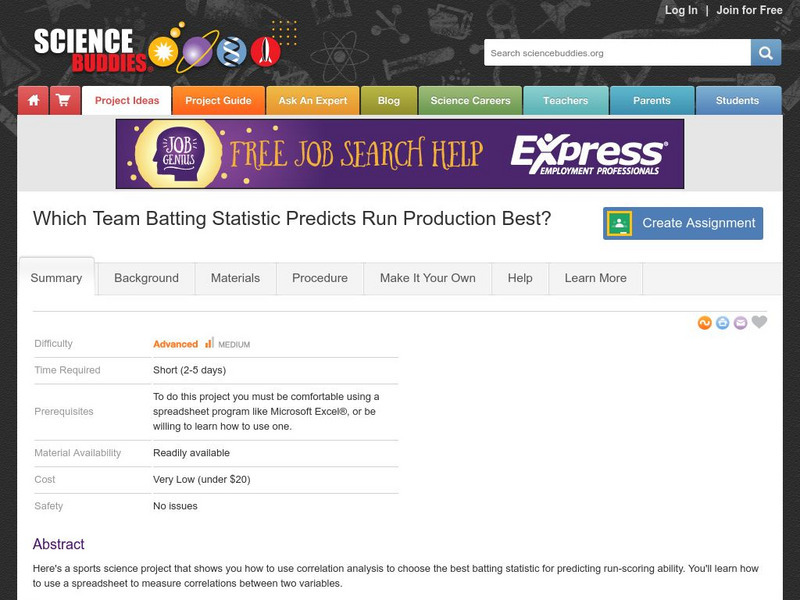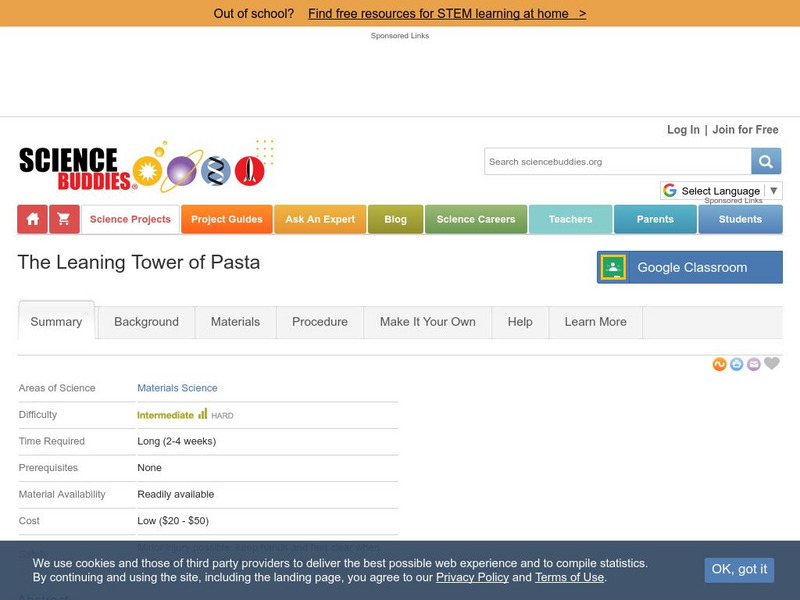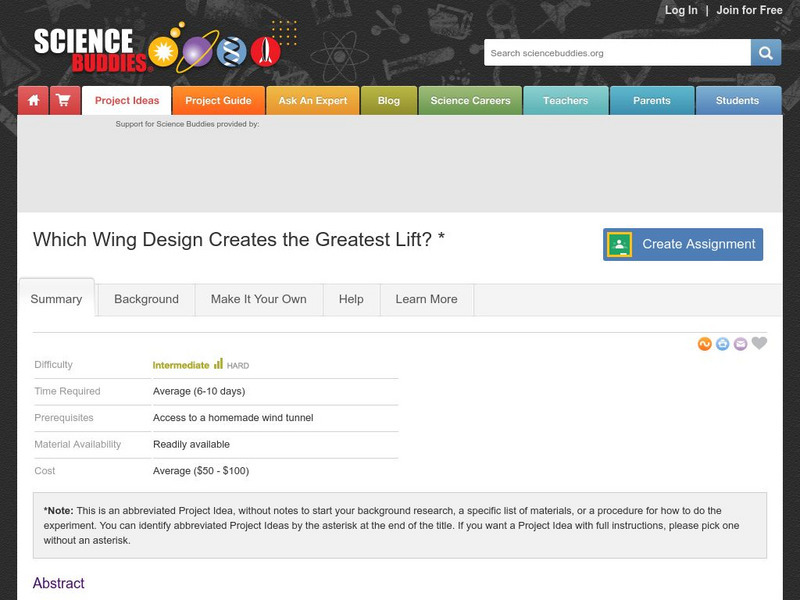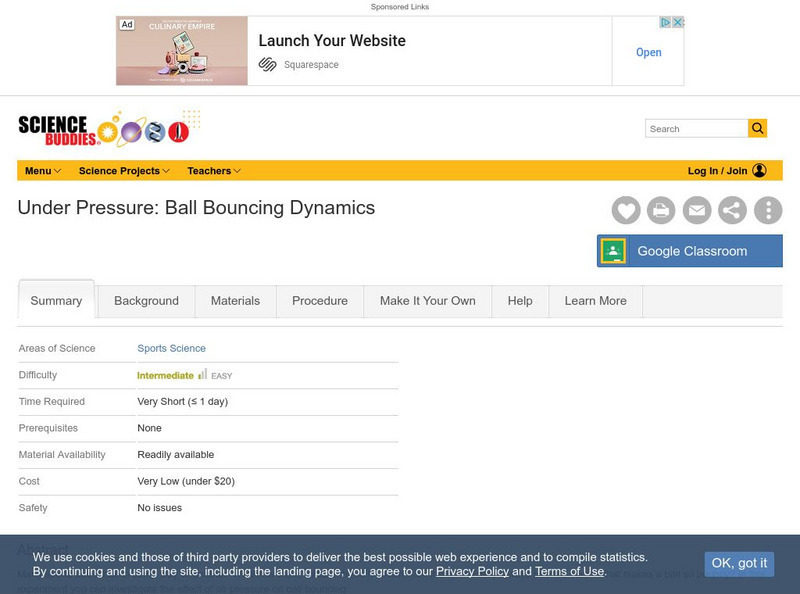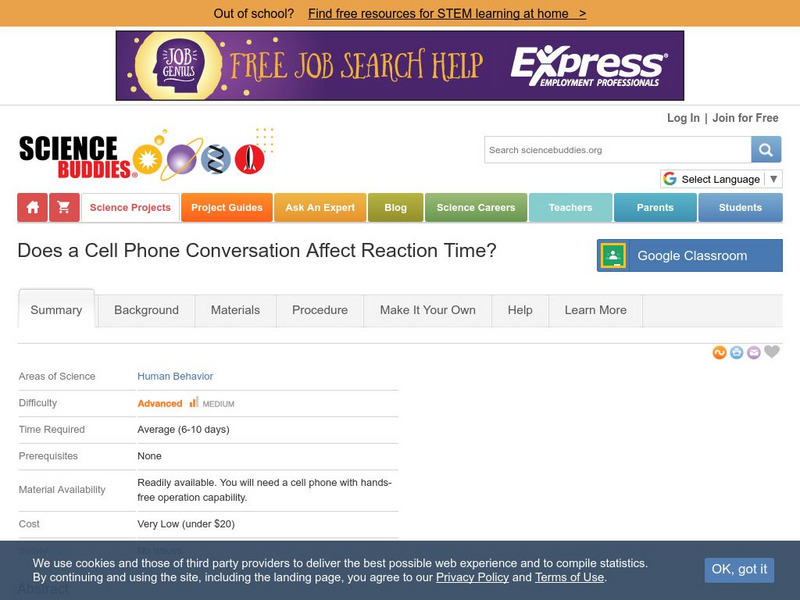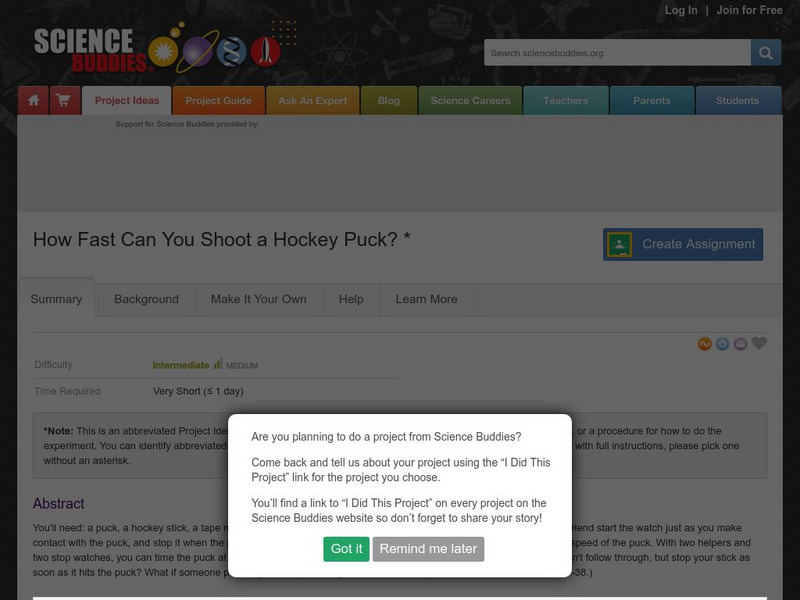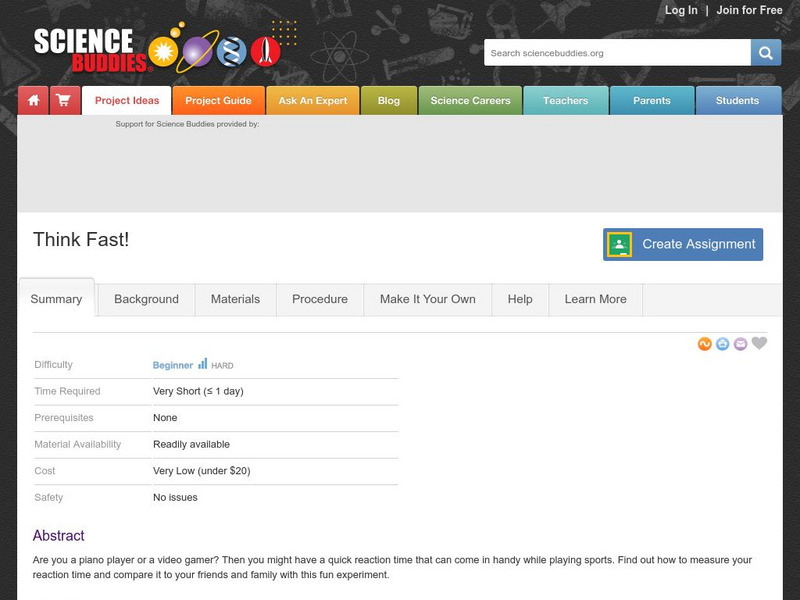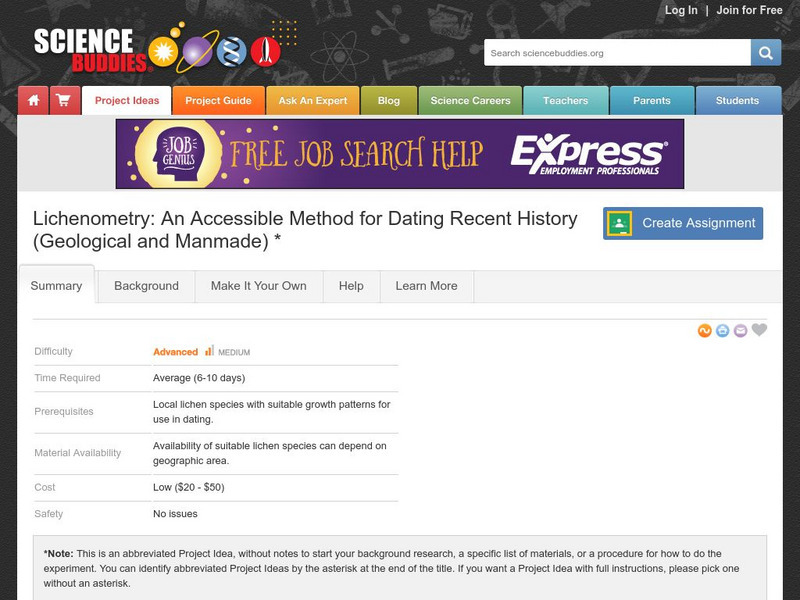Science Buddies
Science Buddies: How Much Baking Powder Do Quick Breads Need?
If you like to bake, this could be a good project for you. There is a purpose for each of the ingredients in your recipes, but not everyone is always aware of what that purpose may be. Though this lab takes multiple days, you will...
Science Buddies
Science Buddies: Can Baking Soda Substitute for Baking Powder in a Recipe?
There's nothing quite like the smell of fresh-baked muffins for breakfast on a Saturday morning. If you're into baking, you might want to try this insightful project that lets you witness the chemistry behind making muffins. You'll get...
Science Buddies
Science Buddies: Determining Iodide Content of Salt
In this week long "kitchen chemistry" project you will use chemicals from the supermarket to test for the presence of iodine and iodide in salt. These are common micronutrients added to some preparations of table salt. A materials list,...
Science Buddies
Science Buddies: How Much Energy Is Stored in Different Types of Food?
In this project you'll learn a method for measuring how much chemical energy is available in different types of food. You will build your own calorimeter to capture the energy released by burning a small food item, like a nut or a piece...
Science Buddies
Science Buddies: Lowering the Freezing Point of Water
When it comes to making ice cream, in order to make the mixture cold enough to freeze, you surround the container with ice and rock salt. This experiment helps you learn how the addition of salt (or other substances) affects the freezing...
Science Buddies
Science Buddies: Using Daphnia to Monitor Water Toxicity
In a bioassay, a living organism serves as a detector for toxins-the same way canaries were used in coal mines to detect invisible toxic gases. In this project, water fleas (Daphnia magna), a freshwater crustacean, are used in a bioassay...
Science Buddies
Science Buddies: Skipping Science: An Experiment in Jump Rope Lengths
A great experiment to determine how different lengths of rope influence the rate of jumping with the rope. The Science Buddies project ideas are set up consistently beginning with an abstract, objective, and introduction, followed by a...
Science Buddies
Science Buddies: Circumscribing a Circle About a Triangle
Here is a project that combines Computer Science and Mathematics. Prove a method for circumscribing a circle about a triangle (as shown). You'll also learn how to create an interactive diagram to illustrate your proof, using an applet...
Science Buddies
Science Buddies: Taking Off on a Tangent
This is an interesting geometry project that goes back to the time of Archimedes, the famous Greek mathematician. You can combine this mathematical project with computer science and take this ancient problem into the twenty-first century...
Science Buddies
Science Buddies: Which Team Batting Statistic Predicts Run Production Best?
Here's a sports science project that shows you how to use correlation analysis to choose the best batting statistic for predicting run-scoring ability. You'll learn how to use a spreadsheet to measure correlations between two variables.
Science Buddies
Science Buddies: Inscribing a Circle in a Triangle Using the Geometry Applet
Here is a project that combines Computer Science and Mathematics. Prove a method for inscribing a circle within a triangle (as shown). You'll also learn how to create an interactive diagram to illustrate your proof, using an applet that...
Science Buddies
Science Buddies: Baseball Bat Debate: What's Better, Wood or Aluminum?
Science and math abound in baseball. In this project, you can produce some interesting baseball statistics of your own and perhaps settle a long-standing debate. You'll set up experiments at your local playing field to find out which...
Science Buddies
Science Buddies: The Leaning Tower of Pasta
Here's a project for a budding architect or structural engineer. Can you make a strong, lightweight tower using only uncooked spaghetti and white glue? In this project, you'll learn about materials testing and apply what you learn to...
Science Buddies
Science Buddies: Nothing but Net: The Science of Shooting Hoops
Swish. What a great sound when you hit the perfect shot and get nothing but net. Here's a project to get you thinking about how you can make that perfect shot more often.
Science Buddies
Science Buddies: Which Wing Design Creates the Greatest Lift?
Airplane wings do not all have the same design. With this Science Buddies project you can design your own wings to see which offers the greatest lift. The Science Buddies project ideas are set up consistently beginning with an abstract,...
Science Buddies
Science Buddies: Are There Dangerous Levels of Lead in Local Soil?
The element lead is a neurotoxin that is particularly dangerous to young children. Among other uses, lead compounds were common paint additives until being phased out for safer titanium-based additives beginning in the 1960's. Lead...
Science Buddies
Science Buddies: Under Pressure: Ball Bouncing Dynamics
Many sports use a ball in some way or another. We throw them, dribble them, hit them, kick them, and they always bounce back. What makes a ball so bouncy? In this experiment you can investigate the effect of air pressure on ball bouncing.
Science Buddies
Science Buddies: Forensic Science: Building Your Own Tool for Identifying Dna
When biologists want to separate different pieces of DNA, RNA, or proteins they use a technique called gel electrophoresis. In this science project you'll build a gel electrophoresis chamber and use it to discover how many components are...
Science Buddies
Science Buddies: Does a Cell Phone Conversation Affect Reaction Time?
Does talking on a cell phone make one a more dangerous driver? Here is an experiment you can do to investigate whether reaction time is adversely affected by a simultaneous phone conversation.
Science Buddies
Science Buddies: How Fast Can You Shoot a Hockey Puck?
In this project, you'll need: a puck, a hockey stick, a tape measure, at least one helper with a stopwatch and an empty rink. Have your friend start the watch just as you make contact with the puck, and stop it when the puck hits the...
Science Buddies
Science Buddies: Think Fast!
Are you a piano player or a video gamer? Then you might have a quick reaction time that can come in handy while playing sports. Find out how to measure your reaction time and compare it to your friends and family with this fun experiment.
Science Buddies
Science Buddies: Are Laminates Stronger?
If you love to hit the half pipe with your snowboard or skateboard, then you have tested the strength and durability of laminates. Laminates are sandwiches of different materials that are glued together in layers to give strength and...
Science Buddies
Science Buddies: Lichenometry: An Accessible Method for Dating Recent History
Geology and archeology are examples of historical sciences. Their practitioners rely on multiple methods for establishing dates and temporal sequences as they seek to construct a history from the available evidence. This project will...
Science Buddies
Science Buddies: Why Do Aerobie Flying Rings Go So Much Further Than Frisbees?
Use the instructions from this Science Buddies project to develop your hypothesis on whether flying rings fly farther than flying disks. The Science Buddies project ideas are set up consistently beginning with an abstract, objective, and...
Other popular searches
- Science Fair Projects
- Science Fair Project Ideas
- Science Fair Project Data
- Tsunami Science Fair Project
- Science Fair Topics
- Science Fair Projects Ideas
- Science Fair Ideas
- Science Fair Experiments
- Science Fair Project Topics
- Science Fair Exhibit
- Science Fair Presentations
- Rockets Science Fair Project
